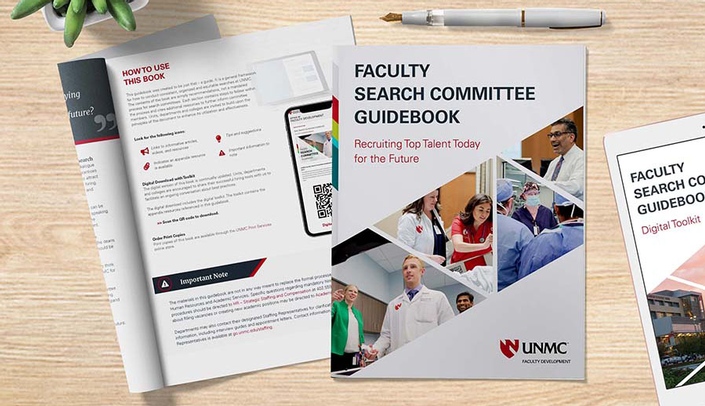A new Faculty Search Committee Guidebook and Digital Toolkit is now available.
The tools were created to provide committees with resources for conducting more organized and equitable searches.
"There are countless resources online for search committees. We wanted to help streamline the process and offer a compilation of best practices to follow," said Linda Love, EdD, director of faculty development. "The guidebook and toolkit are a one-stop resource for these committees to reference during the search process, from start to finish."
For an academic institution, hiring and retaining exceptional faculty is vitally important. Dele Davies, MD, senior vice chancellor for academic affairs, encourages all members engaged in hiring new faculty to use these resources.
"The guidebook and toolkit provide ideas to help departments and colleges lay a solid foundation for attracting and successfully recruiting a diverse candidate pool," he said. "The information included is applicable to faculty new to search committees and those who have conducted many searches. People are the most important part of what we do at UNMC. We must continue to develop recruitment strategies that will advance our mission."
The guide does not replace existing university, college or department procedures but serves as a framework and supplemental resource to current policies. Units, departments and colleges are invited to build upon the principles of the documents to enhance their effectiveness.
While the guidebook offers general best practices for committees undergoing a faculty search, it also includes specific resources to train committees on bias in hiring. Sheritta Strong, MD, assistant vice chancellor for inclusion, underscores the importance of educating on bias. "Oftentimes, the process moves quickly and doesn’t allow committees to take the time to educate themselves on the common pitfalls our brains naturally succumb to when making a series of decisions, like in the hiring process," she said. "Because we are often unaware of our bias, educating ourselves on the types of bias and how and why these biases impact our decisions is the most effective way to create more objectivity in our hiring processes."
In addition to the guidebook and toolkit, a series of e-modules for search committees will be available to reference. The e-modules, centered on bias in hiring, are expected to launch this summer. The Faculty Search Committee Guidebook and Toolkit are available for download online. Additional resources for search committee members can be found on the faculty development website.
